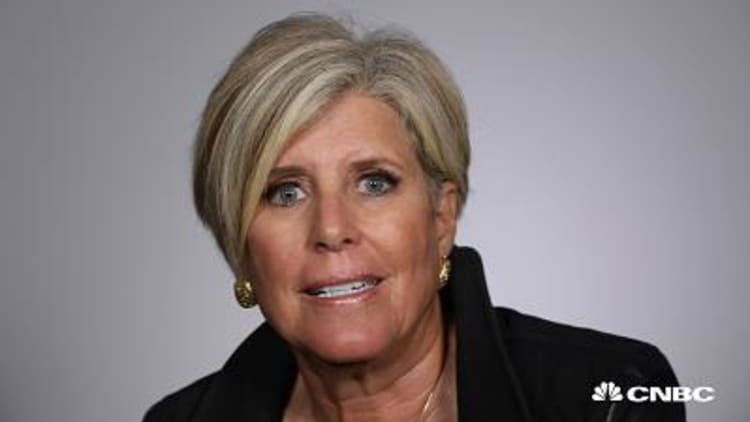Younger Americans like the idea of retiring relatively early. When Bankrate asked millennials, which it defined as Americans ages 18 to 37, what the perfect time to retire would be, they said 61 years old.
They tend to be optimistic about reaching that goal, too: According to research from Charles Schwab, which surveyed 2,000 Americans aged 16 to 25, they expect to retire, on average, at age 60. That's "seven years earlier than full Social Security benefit eligibility for their age bracket," the report notes.
But are they actually preparing to settle down on the sooner side? CNBC Make It turned to Fidelity, the nation's largest retirement-plan provider, for the numbers.
As of the second quarter of 2018, millennials — which Fidelity defined as those ages 21 to 37 — with 401(k)s had an average balance of $25,500 and were contributing 7.3 percent of their paychecks. Fidelity also found that employers were matching, on average, 4.1 percent, which put the total savings rate for millennials with 401(k)s at 11.3 percent.
While younger adults are saving more today than they were five years ago — in 2013, millennials with 401(k)s had an average balance of $13,100 and were contributing 5.9 percent of their paychecks — many of them are not on track to retire in their 60s. Keep in mind that the numbers from Fidelity represent young people who are saving in the first place: Roughly two-thirds of millennials have nothing saved for the future at all.

How much should you be saving?
The answer to this is highly personal and depends on your lifestyle and spending habits, but there are a few basic guidelines to follow if you want to retire comfortably.
For starters, Fidelity suggests that everyone, even those just getting started, set aside 15 percent of their income in a retirement account. "We believe if you save 15 percent throughout your career you will have enough to maintain your lifestyle in retirement," Katie Taylor, VP of thought leadership at Fidelity Investments, tells CNBC Make It.
That 15 percent can include any matching contributions from your employer, she says.
Other experts, including co-founder of AE Wealth Management David Bach, say that if you set aside at least 10 percent of your income, you'll set yourself up to be fine. Of course, more is better: Bach adds that if you want to retire "rich," save 15 to 20 percent, and if you want to retire early, save 20 percent or more.

Another rule of thumb, according to Fidelity, is to have 10 times your final salary in savings if you want to retire by age 67. It suggests a timeline to use in order to get to that magic number:
- By age 30: Have the equivalent of your starting salary saved
- By age 35: Have two times your salary saved
- By age 40: Have three times your salary saved
- By age 45: Have four times your salary saved
- By age 50: Have six times your salary saved
- By age 55: Have seven times your salary saved
- By age 60: Have eight times your salary saved
- By age 67: Have 10 times your salary saved

How do you get on track?
If you're not setting aside 10-15 percent of your income or you don't have the equivalent of your starting salary saved by age 30, don't panic. There are strategies you can use that will help you get to, or nearer to, where you need to be.
First things first: "When you are hired with an employer, make sure that you are inquiring about 401(k) benefits," says Taylor. "Find out what kind of 401(k) they have and make sure you get enrolled as soon as you're eligible. A lot of employers will automatically enroll you, but you can always proactively enroll."
Next, find out if your company offers a 401(k) match. If they do, take full advantage of it, says Taylor: "If there is a match that's 3 percent, make sure that you're saving at least 3 percent. Otherwise, you're leaving free money on the table."
Another useful tool you may have access to is "auto-increase," which allows you to choose the percentage you want to raise your contributions by and how often. This way, you won't forget to up your contributions or talk yourself out of setting aside a larger chunk when the time comes.
Most importantly, start setting aside money now. "It's harder to catch up if don't save," says Taylor. "If you spend the first half of your career not saving, you've got to do a lot of catch up later in your career and you don't have the time in the market to ride out any fluctuations. It's always a good idea to get started as early as possible."

The share of 'super savers' is growing
While the average millennial with a 401(k) has $25,500 in retirement savings, and most young people have nothing saved for the future at all, there is a growing population of what Fidelity calls "super savers."
About one-fifth of millennials, 22 percent, are saving 15 percent or more of their income, says Taylor: "These are young people — admittedly, they do make a little bit more than the average, in terms of income — who have prioritized saving and they are hitting that 15 percent or more. That's really encouraging, that one in five millennials are taking saving for retirement really seriously."
Another encouraging statistic: The average 401(k) balance for millennials who have been contributing to their employer-sponsored plan for 10 years straight is $120,700, Fidelity tells CNBC Make It.
What if you don't have a 401(k)?
If you're one of the many Americans without access to a 401(k), don't stress, and don't use that as an excuse to put off saving for retirement. You have plenty of other options, including a traditional, Roth or SEP IRA, a health savings account (HSA) or a normal investment account.
Read up on all of your options, choose an account to fund and start setting aside money for your future today.
Don't miss: Here's how much money Americans have in their 401(k)s at every age
Like this story? Subscribe to CNBC Make It on YouTube!




